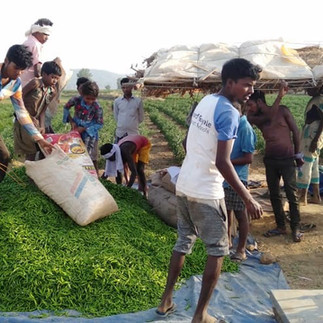Empowering Tribal Farmers: The Haritkranti FPO Success Story
- READS Stories

- Apr 21, 2024
- 2 min read
Introduction:
The Haritkranti Aadiwasi Sahkari Samiti marydit Bagicha project, supported by the PODF and implemented by the Rural Education and Development Society (READS), has brought about a remarkable transformation in the lives of tribal farmers in Bagicha Block, Jashpur district, Chhattisgarh. This success story highlights the journey of empowerment and economic upliftment of the marginalized farming community through the establishment of a Farmer Producer Organization (FPO).
I. Pre-Project Status:
Before the intervention of the FPO project, the farmers in Jashpur district were grappling with exploitation by middlemen and lack of access to fair markets. They faced challenges in obtaining fair prices for their produce and often resorted to migration for labor work due to low agricultural incomes. The socio-economic condition was dismal, with basic facilities lacking in the region.
II. Project Implementation:
With the support of NABARD and PODF, the Haritkranti FPO was sanctioned in March 2015, aiming to address the challenges faced by the farming community. The FPO, comprising 1000 members, primarily belonging to scheduled tribes and women, was established through collaborative efforts. Two agricultural input centers were set up, enabling farmers to procure quality seeds, fertilizers, and pesticides at subsidized rates. Additionally, the FPO ventured into direct selling of produce such as chilies, tomatoes, and scented rice in major markets across neighboring states.
III. Post-Project Status:
Following the intervention of the project, significant changes were observed in the agricultural landscape of the region. There was an expansion in horticulture and agriculture areas, along with a shift in cropping patterns. Improved agricultural practices such as System of Rice Intensification (SRI), organic farming, and drip irrigation were adopted, leading to enhanced productivity and production.\
Social and Economic Impact:
The establishment of the FPO empowered farmers to receive fair prices for their produce, thereby increasing their income. By eliminating middlemen and establishing their own input centers, farmers saved significantly on input costs. Collaborative efforts with the district administration resulted in the establishment of a Chilli Processing Unit, further diversifying income sources for FPO members. Overall, the project has propelled tribal farmers towards economic self-sufficiency and paved the way for doubling their income through innovative marketing and processing initiatives.
Conclusion:
The Haritkranti FPO project stands as a testament to the power of collective action and community-led development. Through strategic interventions and partnerships, it has brought about a positive change in the lives of tribal farmers, transforming them from victims of exploitation to empowered entrepreneurs. As we celebrate this success, it is imperative to sustain and scale up such initiatives to ensure the holistic development of rural communities across India.










